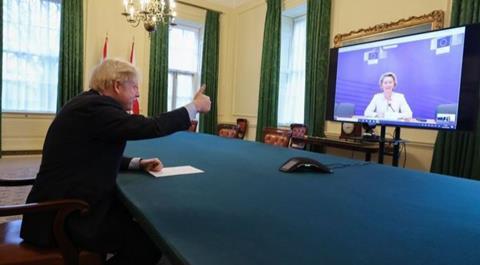CLC chair hails news and says agreement will bring ‘certainty at a time when it is needed most’
The UK and EU finally agreed a post-Brexit trade deal this afternoon, ending months of negotiations over fishing rights and future business rules.
Today’s agreement comes just over a week before the UK officially leaves the bloc when its transition period out of the EU ends at midnight on 31 December.

The head of policy at the National Federation of Builders and chair of the Construction Leadership Council’s Brexit working group hailed the move as “a good day for British construction”.
James Butcher added: “The UK and EU’s announcement of a trade deal will come as welcome relief, not just to the construction industry but to the global economy.
“The agreements reached will enable construction companies to continue to reliably forecast the cost and availability of products and materials imported from the EU or comprising components made in the EU. The mutual co-operation in respect of reducing technical trade barriers and co-operation at the border will also undoubtedly help to avoid some of the risks of delay and disruption.
“What this means is that in January we will not see the inflationary shock of tariff and quota introductions or the expected currency depreciation associated with a no-deal. This deal delivers certainty at a time when it is needed most.”
But the chief executive of RIBA Alan Vallance said: “While this deal provides us with some certainty around the future relationship between the UK and EU, hesitation and vagueness around trade in services remains a serious concern for our profession. Architects in both the UK and EU were clear about the need for a continued agreement on recognition of professional qualifications, and it is deeply worrying that this does not seem to be part of the deal as it stands.”
He added: “It’s our hope, however, that this deal will keep the costs of importing construction materials down and – current border issues aside – at least provide some confidence over trading in goods.”
In a statement, the government said: “We have signed the first free trade agreement based on zero tariffs and zero quotas that has ever been achieved with the EU.
“The deal is the biggest bilateral trade deal signed by either side, covering trade worth £668bn in 2019.
“The deal also guarantees that we are no longer in the lunar pull of the EU, we are not bound by EU rules, there is no role for the European Court of Justice and all of our key red lines about returning sovereignty have been achieved.
“It means that we will have full political and economic independence on 1st January 2021.”
“A points-based immigration system will put us in full control of who enters the UK and free movement will end.
“We have delivered this great deal for the entire United Kingdom in record time, and under extremely challenging conditions, which protects the integrity of our internal market and Northern Ireland’s place within it.”
The deal, which is said to run to 2,000 pages, still needs to be made law by both the European and UK parliaments.
The European parliament is unlikely to sign it off before 1 January – although it is still expected to come into force – while the UK government could summon MPs back from their Christmas breaks next week to vote on the deal, widely expected to pass because of the size of prime minister Boris Johnson’s majority and the fact it is set to be backed by Labour MPs as well.


























No comments yet